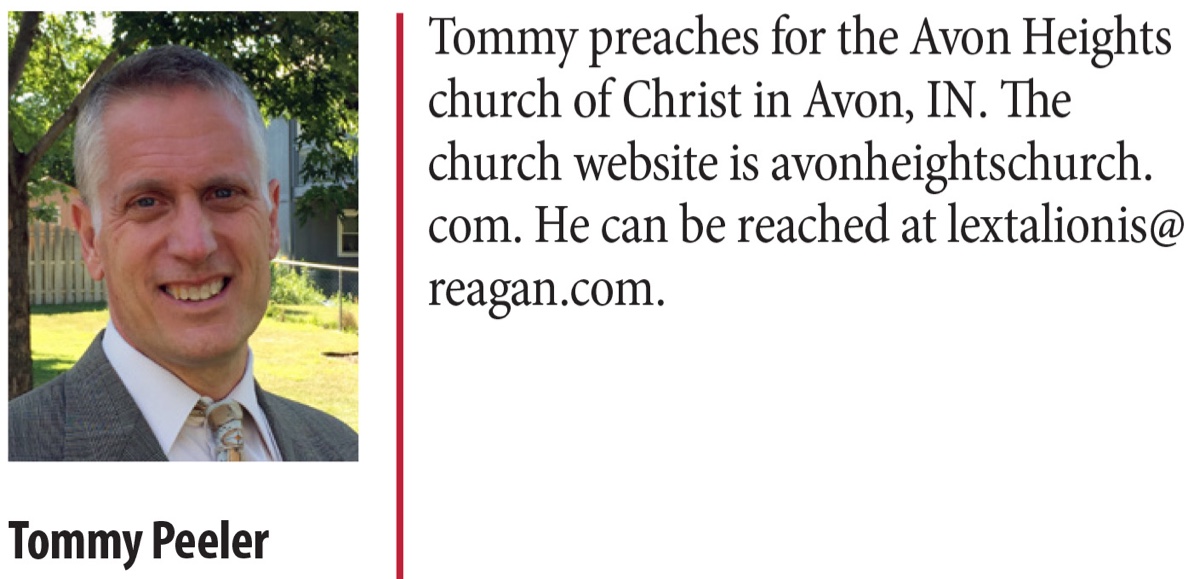By Tommy Peeler
Synopsis: Christians are commanded to practice hospitality (Rom. 12:13), which suggests a welcoming attitude toward brethren and also strangers.
Hebrews 13:1-2 says, “Let love of the brethren continue. Do not neglect to show hospitality to strangers, for by this some have entertained angels without knowing it.”
One interesting point in this verse is the close connection between love and hospitality, a connection made in other passages as well. 1 Peter 4:8-9 states, “Above all, keep fervent in your love for one another, because love covers a multitude of sins. Be hospitable to one another without complaint.” Romans 12:9 reminds us, “Let love be without hypocrisy” and Romans 12:10 calls us to “be devoted to one another in brotherly love.” A few verses later, we are told to be “practicing hospitality” (Rom. 12:13). 3 John 5-8 praises Gaius for his reception of those who spoke God’s truth and the preachers he received testified to his love before the assembly (3 John 6). Our love is to display itself in hospitality. An elder is to practice hospitality (1 Tim. 3:2; Titus 1:8). A widow who would be cared for by the local church is to be one who “has shown hospitality to strangers” (1 Tim. 5:10). Early Christians often engaged in hospitality at great personal risk to themselves (Acts 17:6-7; Rom. 16:3-5). “Little children, let us not love with word or with tongue, but in deed and truth” (1 John 3:18).
Another thought arising from Hebrews 13:1-2 worthy of attention is that some have entertained angels without knowing it. In reading this, we remember especially Abraham (Gen. 18:1-8) and Lot (Gen. 19:1-11), possibly even Gideon (Judg. 6:11-24) and Manoah (Judg. 13:8-23). These were all literal cases where real men and women interacted with angels. One message for us is that hospitality often brings a greater blessing to the giver than to the recipient. How many times have hosts given of themselves for their guests only to receive a greater blessing? 1 Kings 17:8-24 and 2 Kings 4:8-37 serve as good Biblical illustrations of this principle. Also, Hebrews 13:2 shows us that our visitors may be of greater importance than we could ever imagine. Jesus will say to those on His right hand, “I was hungry, and you gave Me something to eat; I was thirsty, and you gave Me something to drink; I was a stranger, and you invited Me in” (Matt. 25:35). The righteous will question when this ever happened (Matt. 25:37-39), and Jesus will say, “To the extent that you did it to one of these brothers of Mine, even the least of them, you did it to Me” (Matt. 25:40). Do we see Jesus in the face of our fellow Christians? Do we realize the kindness shown to them is kindness shown to Him? When we help the least of His people, we are serving Him. These small acts of service in His name may have eternal significance (Matt. 10:42).
Genesis 18 provides a classic illustration of real hospitality by Abraham. The first verse reveals the identity of the visitor to the readers: “Now the LORD appeared to him. . .” (Gen. 18:1), but Abraham was unaware of who He was. Yet, Abraham shows great kindness to his visitors. He ran to meet them (despite being ninety-nine years old) and bowed himself before them (Gen. 18:2). He addresses his guest as “lord” (Gen. 18:3) and speaks of himself as “your servant” (Gen. 18:3, 5). While the Hebrew word translated lord is used in speaking of God (Ps. 8:1, 9), it is also used as a term of respect toward another person (Gen. 18:12; 23:6, 11, 15). Abraham does not even eat with his guests, but while the visitors eat, he stands by them ready to serve (Gen. 18:8). Abraham shows great respect for his guests.
As he invites them to be his guests, he emphasizes how they will not be any inconvenience to him. He speaks of bringing “a little water” to wash their feet (Gen. 18:4) and “a piece of bread” to satisfy their hunger (Gen. 18:5). He seeks to minimize his sacrifice and make his visitors feel comfortable in accepting his kindness. The actual description of Abraham’s service and care is striking. While Abraham spoke of “a piece of bread,” he asks Sarah to prepare “three measures of fine flour” (Gen. 18:6). This word for flour elsewhere in the Pentateuch “is only used in cereal offerings and for making the bread of the presence (Lev. 24:5)” (Wenham, Genesis 16-50, 47). The word for measure is used in 1 Samuel 25:18 and 1 Kings 18:32. These references seem to indicate that these three measures of the best flour would produce a large amount of bread, much more than these visitors could eat. Abraham said nothing to the guests of preparing meat, but “Abraham also ran to the herd and took a tender calf and gave it to the servant, and he hurried to prepare it” (Gen. 18:7). He treated these visitors as if they were the prodigal son and killed the fattened calf for them (Luke 15:22-24). He also prepared curds and milk for his guests (Gen. 18:8). Everything about Abraham’s hospitality is lavish. He gave them the best of what he had. Many of us have been blessed to receive this kind of treatment from some hosts who had comparatively little.
Are you a “son of Abraham”? Interestingly, the rich man of Luke 16:19-31 views himself that way. He called Abraham “father” (Luke 16:24, 27, 30), and Abraham even refers to him as his child (Luke 16:25). However, there is more to being a son of Abraham than physical descent. The fact that the rich man ignored Lazarus, who was continually at his gate (Luke 16:19-21), demonstrates that he failed to learn from the example of Abraham’s hospitality in Genesis 18. If we are Abraham’s spiritual children, we need to follow his example (John 8:40).
There is no more gracious host than the LORD Himself. Psalm 23 emphasizes the LORD as the good shepherd and as a gracious host. The Host does many of the things for the guest that the Shepherd does for the sheep. He provides food, drink, and shelter. “You prepare a table before Me in the presence of my enemies; You have anointed my head with oil; My cup overflows” (Ps. 23:5). In the illustration in Genesis 18, Abraham offered his visitors water to wash their feet. It was a common act of hospitality to provide guests with water to wash their feet after travelling the dusty roads in sandals (Gen. 19:2; 24:32; 43:24; Judg. 19:21). Simon the Pharisee is rebuked for failing to perform this kindness for Jesus (Luke 7:44). An examination of these passages shows that each time water was provided, the guest washed his own feet. Even the greatest host rarely, if ever, washed his guest’s feet. However, Jesus, as the host, washed His disciple’s feet (John 13:1-11). “There is no instance in either Jewish or Greco-Roman sources of a superior washing the feet of an inferior” (D. A. Carson, John, 462). We sometimes say, “What an amazing God we serve.” True, but even more overwhelming is that this amazing God serves us (Luke 12:37). There is no host more gracious than the LORD Himself.
Final salvation is also pictured as a great banquet that the LORD has offered to all peoples (Isa. 25:6-9; Matt. 8:11; Luke 13:28-29; 14:15-24; Rev. 19:7-9). I am not seeking to argue whether this is literal or symbolic. However, those of us who are blessed to be guests at His table must seek to use our tables to serve in His kingdom.


